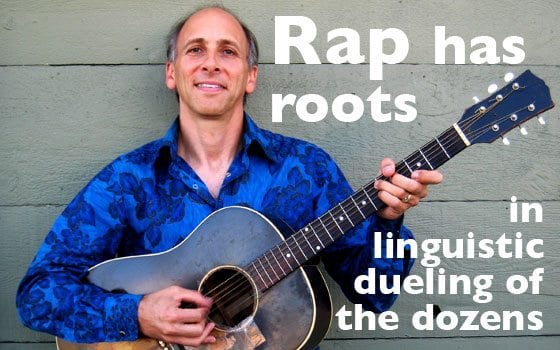

In 1948, Langston Hughes wrote a column for “The Chicago Defender” explaining the miscommunication that frequently happens between blacks and whites.
To illustrate his point he told an anecdote: A black chauffeur took his boss’s car out one morning to do some shopping, and when he returned, forgot to remove his purchases from the backseat.
When the white employer got in the car later that afternoon, he asked who the packages belonged to. Fed up, the driver said curtly, “Your mamma’s.”
His employer replied, no, that couldn’t be — his mother hadn’t left the house yet that day. “Fortunately, a complete lack of understanding of the little nuances involved prevented the chauffeur from getting fired,” Hughes wrote.
The driver’s quip — which fell on deaf ears to his white boss — is an example of the dozens, an African American linguistic tradition of family insults and verbal sparring that dates back more than a century.
Adolescent boys would play the dozens by trading clever, rhymed put-downs — which typically included profane “yo mamma” jokes — with each round growing more ridiculous than the last. One example goes: “I can tell by the shape of your jaw / A monkey must have been your pa / ‘Cause you look jus’ like your ma.”
But the dozens are more than a footnote in black literary history. As Elijah Wald explains in his new book, “The Dozens: A History of Rap’s Mama,” this linguistic dueling laid the foundation for African American musical traditions — and in particular, rap.
“One of the standard things that older people say about rap is, ‘We didn’t talk like that when we were kids,’” Wald said. “It’s simply not true. One hundred years ago, people were using all the words in exactly the same way that people are using them today.”
According to Wald, a Grammy Award-winning blues guitarist and music historian, the first references to the dozens appeared in the early 20th century, but the origin of the term is still up for debate. Some have suggested that the dozens is a reference to shooting dice — in which 12 is the worst score — or that it comes from “the dirty dozens,” a phrase for dishonorable people.
But Wald says it is “most likely” that the name stems from the tradition of rhyming church songs that numbered things in dozens, such as the Twelve Days of Christmas. “There were a lot of those in the Christian church, going back to the Middle Ages,” he explained. “One of the suggestions is that people started doing dirty satires on them, so you had the Bible dozens, then you had the dirty dozens.”
As Wald’s research shows, the tradition of the dozens as mother insults and lyrical battling stretches all the way back to Africa. Some circumcision ceremonies, for instance, “include lines that say f— your mother,” Wald said. “And that’s part of the formal, official song that some tribes sing in becoming men.”
In parts of West Africa, adolescent boys frequently recite “combat poetry” before, during and after wrestling matches, and this also includes references to an opponent’s mother’s genitalia. “In African language, just as in English, there are polite and impolite words for the body parts, and they use the impolite words, the insult words,” Wald went on. “So it’s very deep in African culture and in the Diaspora.”
Today, he explained, the dozens live on through rap music. Some rap artists lift lines from traditional dozens lyrics. In addition, Wald said the format of rap battling mimics the verbal combat of the dozens. “I’ve talked to lots of older black people who say, ‘Kids think rap battling is something new, but we were doing that in the streets when I was a kid,’” Wald said. “They were talking about the dozens.”
One challenge to studying the dozens that Wald notes is censorship. Before the emergence of rap music, many publishers and recording companies found the dozens too obscene and refrained from printing or recording them in full. In addition, many adolescents would censor themselves when white researchers would observe or record them playing the dozens. “One of the central points I’m trying to make in my book is that censorship has kept us from looking clearly at a lot of our history,” Wald said. “I don’t care if we’re talking about white or black folk history, if you try to make it all pretty, you pretend that a lot of things didn’t exist that did exist.”






